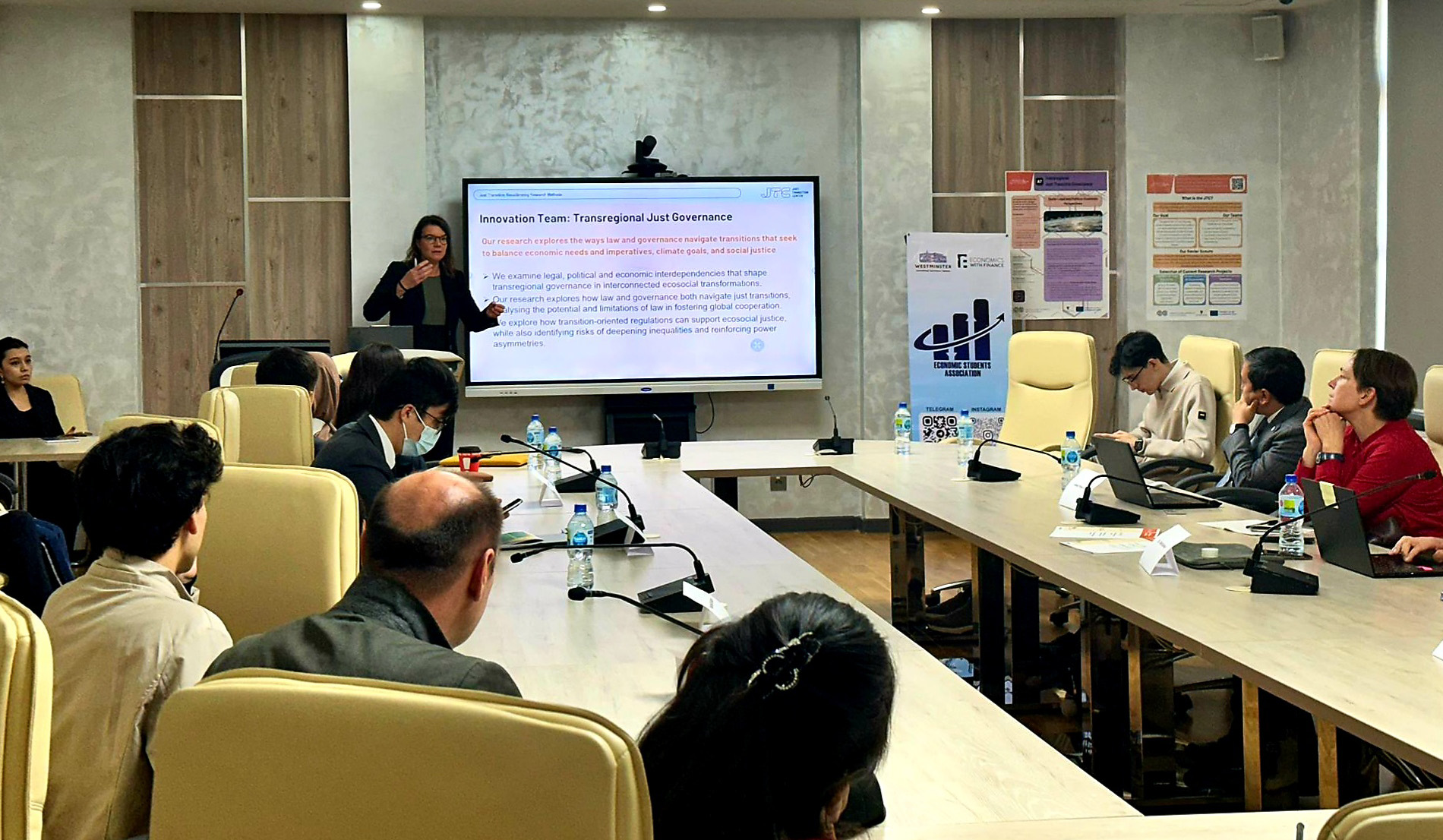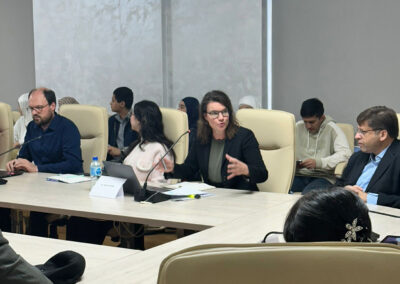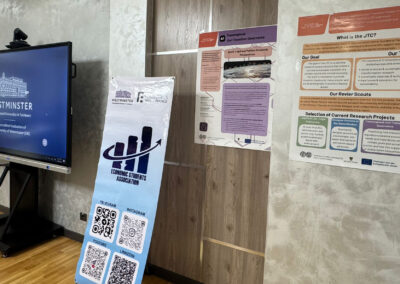Amber Shuai Han and PD Dr Katrin Seidel

On October 6, 2025 JTC Innovationteam A7 (MLU-JTC) participated in the roundtable discussion “Just Transition in Uzbekistan: Challenges and Opportunities”, hosted by Westminster International University in Tashkent (WUIT).
The event brought together key political decision-makers, transnational economic actors, and academic experts to critically discuss Uzbekistan’s green economy path. The JTC delegation – PD Dr. Katrin Seidel, Dr. Timm Sureau and Amber Shuai Han – joined WIUT Business School colleagues and other invited speakers in a vibrant exchange on advancing equitable and green economic and legal reforms.
Key themes
Transitioning to a green economy requires active engagement from business, policy and academic sectors. For example, Prof. Murodullo Bazarov highlighted WIUT’s the university’s “Green Economy” curriculum, emphasizing the importance of linking theory with practice and equipping students with the skills needed for engaging in emerging green industries. Jon Zaidi from ACWA Power shared an industry perspective, outlining the company’s major investments in Uzbekistan’s renewable sector and pioneering green hydrogen initiatives. He underlined social benefits such as prioritizing local suppliers and workforce participation. Moreover, Temur Narzikulov, a representative of Ministry of Economy and Finance, sketched Uzbekistan’s pragmatic and ambitious Green Transition approach by highlighting that the objective is “net zero, not an economic halt”. He also explained the country’s strategy to access the carbon trade market and the role of World Bank’s climate and energy finance mechanism (iCRAFT program) plays.
Katrin Seidel and Timm Sureau introduced JTC’s mission and their innovation team ‘Transregional Just Transition Governance’. Based in Germany’s former coal-mining region, the researchers explore how law and governance can and should balance economic needs, climate goals, and social justice in fossil fuel phase-out processes.
Dr. Seidel shared preliminary research insights on Uzbekistan’s green transition research, noting the potential of the World Bank-supported iCRAFT in terms of institutional reform, carbon finance integration, and social safeguards. She also highlighted implementation challenges concerning the social acceptance of energy reform and its associated energy prices for households (which have almost doubled for many), a factor that raises public resistance. A critical challenge is managing the social impact through communication and support, especially given that energy was very cheap before and consumers now need to adapt their behavior to higher prices and efficiency measures. Another issue raised by Uzbek research participants is the need for sustained institutional coordination. Sometimes, conflicting interests among key actors (such as ministries of energy, market regulators, public sector entities) with different agendas – such as increasing energy supply versus promoting energy efficiency – can create friction that complicates unified reform implementation. Capacity building, and balanced policy design remain key to advancing the country’s transition. We have also learned that modernizing infrastructure requires significant investment and international cooperation, as inefficient energy transmission infrastructure leads to high energy losses and presents a barrier to realizing the full potential of renewable energy.
continue reading
Challenges in Focus
The discussions also emphasized the necessity of integrating environmental objectives more profoundly into economic and legal policy and law, developing long-term decarbonization strategies, and investing in infrastructure and green technology:
The most prominent debate concerned how to reconcile international environmental standards – such as biodiversity safeguards – with the domestic objectives of energy security and economic modernization. The representative of ACWA Power company, emphasized the tensions between the stringent biodiversity requirements imposed by international investors, lenders or non-governmental organizations, and the urgent need to expand energy infrastructure. While valuable, such standards often raise project costs and delay implementation.
The representative of the Ministry of Economics and Finance noted that achieving national climate goals may require investments of $60-95 billion, alongside politically sensitive reforms such as tariff adjustments and the establishment of robust Monitoring, Reporting, and Verification (MRV) systems for emissions. Industry participants voiced concerns over the burdensome compliance expectations and the lack of technical and financial capacity for effective implementation. Environmental justice and biodiversity regulations – though promoting inclusivity – were seen as sources of delay and cost escalation, particularly when introduced without sufficient technical support or financing provisions. Participants also debated the social fairness of energy pricing reforms, acknowledging the potential hardships that vulnerable consumers could face during the transition period.
The event concluded with an engaging Q&A session with WIUT students, reflecting strong interest from the next generation. JTC expressed its gratitude to WIUT’s Business School for hosting this important discussion.
Key Challenges and Outlook in a nutshell
- High costs and social tensions resulting from tariff reforms and subsidy reductions
- Underdeveloped regulatory frameworks for corporate-level emission monitoring, with gaps in data reliability and fraud prevention mechanisms
- Technical and financial barriers to the deployment of renewable energy, including insufficient support for small-scale and household-level projects
- The difficulty of reconciling global environmental standards with national economic growth and energy security priorities
- Governance challenges in balancing biodiversity protection with the need for large-scale renewable infrastructure
Private Sector Perspective: Investment Meets Practical Hurdles
Companies emphasized the need for regulatory stability, access to financing, and transparent frameworks to attract long-term investment in renewables.
Government Perspective: Balancing Growth and Green Ambitions
State officials reiterated Uzbekistan’s strong commitment to decarbonization while pragmatically managing short-term socio-economic risks.
Key Takeaways: Advancing through collaboration
These discussions crystallized the workshop’s central question: how can Uzbekistan define a transition nationally grounded amid global pressures, limited resources, and competing policy objectives. It was affirmed that a successful path forward lies in continued collaboration among government, industry, and academia. The partnership will continue later this month when Dr. Timm Sureau will present on ‘Hydrogen, identity politics of green transitions’ at WIUT’s 4th Tashkent Business and Economics Conference on October 22, 2025, further strengthening institutional collaboration.





